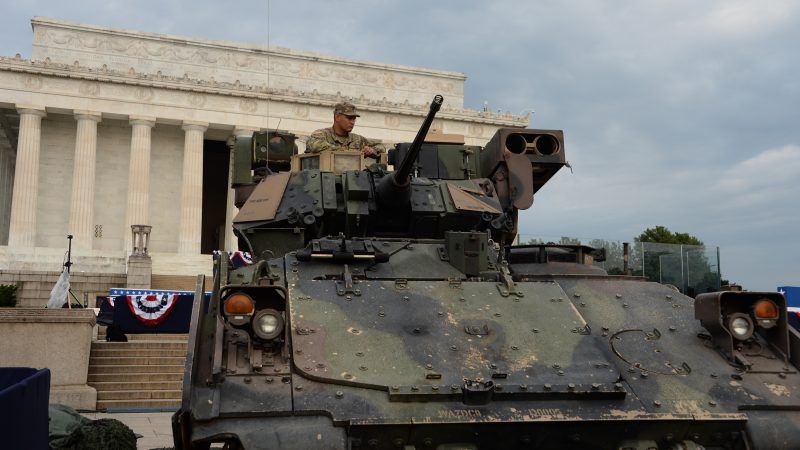Trump Administration Threatens Veto Over Defense Bill That Only Spends $733 Billion
The White House is asking Congress to spend $750 billion on the military this coming fiscal year.

President Donald Trump is threatening to veto a massive defense spending increase for not being quite spendy enough.
On Tuesday, the White House issued a policy statement regarding House Democrats' 2020 National Defense Authorization Act (NDAA), which sets defense spending levels for the coming fiscal year. Democrats in the House are proposing a $733 billion defense budget, an increase of $17 billion over last year's NDAA.
That spending boost is nevertheless $17 billion shy of what the Trump administration is requesting. Anything less than $750 billion, the administration argues, will leave America's military unprepared for the security challenges it faces.
"The level of funding that would be authorized by the bill," reads Tuesday's policy statement "would not fully support critical national security priorities." If the bill "were presented to the President in its current form, his advisors would recommend that he veto it," it adds.
The Senate passed a $750 billion NDAA in late June with wide bipartisan support. Only eight senators voted against the measure.
The House's slightly leaner NDAA would give the White House less than it wants for things like new nuclear weapons and missile defense systems. But without that money, the administration warns, the U.S. is signaling it's "incapable of adjusting its nuclear posture despite a worsening nuclear environment."
The White House also objects to a number of policy changes House Democrats have included in their NDAA. This includes a prohibition on the Trump administration redirecting any defense funding to build a border wall. The Democrats' bill would also require the administration to file lengthy reports to Congress anytime it deployed troops to the U.S.-Mexico border.
Despite Trump's frequent promises to wind down U.S. involvement in Syria, his administration is also objecting to a provision in the House NDAA that would layer more reporting requirements on sending military aid to Syrian rebel groups.
House Republicans, for their part, have also come out swinging against spending a mere $733 billion on defense in the coming fiscal year, with Rep. Mac Thornberry (R–Texas) saying that House Democrats' "arbitrarily lower budget" puts vital programs at risk.
This back and forth between the White House and House Democrats obscures just how marginal the debate over this latest defense spending bill really is. Regardless of whether we settle on a $733 billion or a $750 billion NDAA, we will still be spending far too much on a bloated and overextended military that is tasked with doing much more than just protecting the U.S. homeland.
"It's absurd that the U.S. thinks the only way we can be secure is if we spend $750 billion or $733 billion," the Cato Institute's Christopher Preble, a defense policy scholar, told Reason back in June when was first surfacing. "The problem is we have defined our grand strategy very broad so that the only way we can be secure is if the whole planet is secure."
The narrow range of debate on this year's NDAA shows how little interest most members of Congress have in a more comprehensive review of our defense priorities.
At times, Trump has expressed skepticism about some of our overseas interventions. However, his administration's latest veto threat demonstrates that he too is committed to funding the U.S. military's current role as global policeman.
Rent Free is a weekly newsletter from Christian Britschgi on urbanism and the fight for less regulation, more housing, more property rights, and more freedom in America's cities.


Show Comments (50)